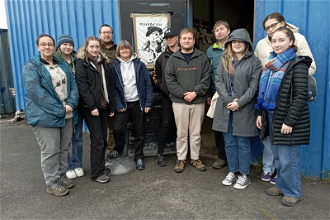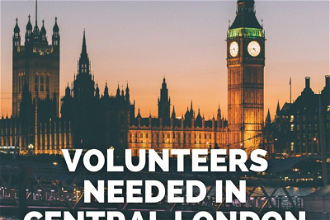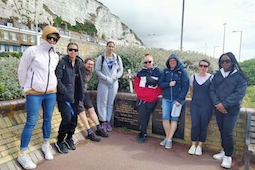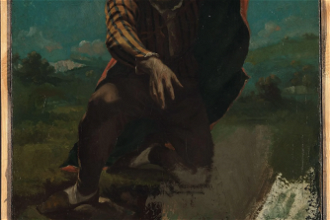Calais Jungle - 'There are now 300 new arrivals every week'
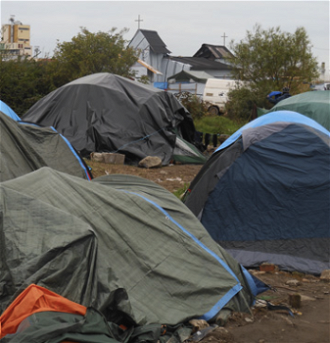
Editor's note - It seems the number of refugees at the Calais 'Jungle' has doubled since I went there last month - from 3,000 to 6,000. Fr Dominic Howarth from Brentwood Diocese has just returned from a second visit and sends this report.
This morning we left Basildon with a fragrant minibus full of 1,000 "packets of hope and love": a toothbrush, a tube of toothpaste, a bar of soap, two pairs of underpants, two pairs of socks and a message of hope from a schoolchild. It took less than an hour to give the packets away - each one taken by outstretched hands, often with a "thankyou" and with queues quickly forming each time we stopped to distribute in a fresh part of the camp.
I cannot find words to describe how humbling and saddening it is to hand another human being a little packet of such basic essentials and to be met with such evident need, and such gratitude. Perhaps the most telling thing is that the 1,000 packets were transported in larger boxes and bags - and yet now the minibus is totally empty of all packaging. Why? Because the 6,000 people living in the Calais jungle are so desperate for any scrap of usable material that even the empty boxes and bags were eagerly taken away.
The temperature today was about ten degrees - it was a cloudy, drizzly day. The sand of the Calais dunes is already, in places, turning to mud - and in January and February in Calais, it snows. Today, we saw many refugees in flip-flops and shorts. The vast majority are living in the most basic of shelters - little tarpaulin and bin bag constructions, with the edges weighted down by stones to try and keep out the wind and the water. We met John, a volunteer who came for three days and has now been there for six weeks. He described how the rough conditions and lack of clothes washing facilities meant a pair of trousers might last a month, at best. And the refugees were so grateful for pants, and socks. This is basic, subsistence living. 300 new refugees are arriving every week - by January there could be 10,000 people living here; it is almost unimaginable.
Within our packets, the messages from the children stirred hearts and gave hope. The refugees translated for each other, and then came back to thank us again - because the children had written that they were praying for the refugees, that they had not forgotten the refugees, that they hoped they would soon find homes. Simple messages, of such encouragement, and it was clear that they mattered. The very presence of volunteers, and aid, is about the only thing that gives the refugees any hope.
For there is a terrible contrast in Calais - literally on the same industrial estate as the 'L'Auberge des Migrants' warehouse there are some of the biggest wine warehouses in the country. As tourists stock up with Christmas booze, those for whom there is no room at the inn shiver in the cold.
Sanitation is a particularly awful concern. Already many refugees are suffering from scabies because of a very poor diet, and headlice for want of proper washing facilities for clothes or hair. There are a few standpipes, and a handful of toilets, dotted intermittently throughout the camp. This month the University of Birmingham published a report highlighting that all the conditions for a cholera epidemic are now present.
I cannot find words to describe how humbling and saddening it is to hand another human being a little packet of such basic essentials
As tourists stock up with Christmas booze, those for whom there is no room at the inn shiver in the cold.'Secours Catholique', 'Médecins Sans Frontiers' and 'L'Auberge des Migrants' along with other volunteer groups are holding the very fragile infrastructure together. There is a large generator now, and plans for wifi across the camp so that desperate refugees can contact relatives who do not know if they are alive or dead. It is probably worth noting that some people have seen pictures of the refugees with phones and have said: "They all have mobiles; they must be doing OK." This is to utterly forget the African and Middle Eastern context; until a few years ago only the very rich had phones, because landlines don't really get fitted easily in such terrain. So the mobile phone has been a revolution in African and Middle Eastern communication - they are cheap, and plentiful, and everyone has one.
What has the visit today shown us? That more and more desperate people are arriving into this small and unsuitable patch of land 22 miles from the UK, and living in utter squalor. The 'jungle' is more crowded than in September, and facilities are more stretched. Amazingly, in amongst this, there are a handful of small schools functioning, to try to support the few children who are there. There is an artists' area, where music and painting flourish. There is the church, and several mosques, peacefully co-existing. And there are the volunteers.
The best thing about today's visit was to see the volunteers in action; aid distribution is much better co-ordinated now, and the volunteers just plead that people don't turn up at the camp unannounced, or with unsorted items. Today we followed clear rules for distribution put in place by 'L'Auberge des Migrants' and it worked very calmly and well. The construction of better shelters is a major priority, and we saw this in action as carpenters from the UK gave their time and talent to create pre-fabricated frames that can be swiftly bolted together at the camp, and covered with thick tarpaulin.
And the most difficult thing about today's visit? 6,000 people are in a forlorn and forgotten corner of Northern Europe, stuck. Where do they want to go? Home. And where is home? A litany of the most violent and dangerous places in the world right now - Syria, Eritrea, Iraq, Kurdistan, Sudan. ... They do not know if family and friends are alive. Each day the volunteers find orphaned children, separated from families at European borders, or somewhere on a journey, and utterly bewildered. And the adults are just as bewildered, lost. They are trying to make community - the art, the music, cooking for each other, sharing the little they have. But behind every set of eyes is the unspoken question that defines life here: "How long will I be living like this?"
As a Christian, I believe that every person is divinely created, that we are all sisters and brothers. Many of the volunteers are Christian, some are Muslim, and some are of no faith, inspired to be in Calais because they just know that there are people in urgent need, and that people are people, whatever their skin colour, background, or anything else. One of the most poignant signs in the artists area reads, "Ici on vend le vaccine contre le racism" - "Here we offer the antidode to racism." Another sign translates as "We must learn to live together like brothers if we are not going to die together like idiots." It is framed by the spent casings of bullets.
What happens next is anyone's guess - if there is no political action then the squalor will continue. Children will be born in the Calais jungle. A harsh winter will cause deaths there, perhaps many, for the people are already weak and malnourished. But behind every set of eyes is the unspoken question that defines life here: "How long will I be living like this?"
If you have read this far, please share these words; please share them with those in political power, and ask them what they are doing to help the thousands stuck in Calais. They cannot go home. Our Government has paid for fences and barbed wire to keep them out of the UK. So now what?
And in the meantime, we will keep our "little packets of hope and love" going from Basildon; we'll adjust the packets for the winter, using money that has been donated, for people have been so generous in these months. And in January, when we know the latest needs, we will ask again for help. For updates,
please visit: www.basildoncatholics.org
Jesus said: "I have come so that you may have life, and have it to the full." (John 10:10). It is time for us to help others to live again.
'Seeking Sanctuary' aims to raise awareness about this situation and is organising basic humanitarian assistance through Faith Communities and Community Organisations in partnership with the experienced aid agency 'Secours Catholique'. For further information on how you or your organisation can help, contact Ben Bano 0n 07887 651117 or Phil Kerton on 01474 873802. To check their latest news, visit: http://seekingsanctuary.weebly.com/



